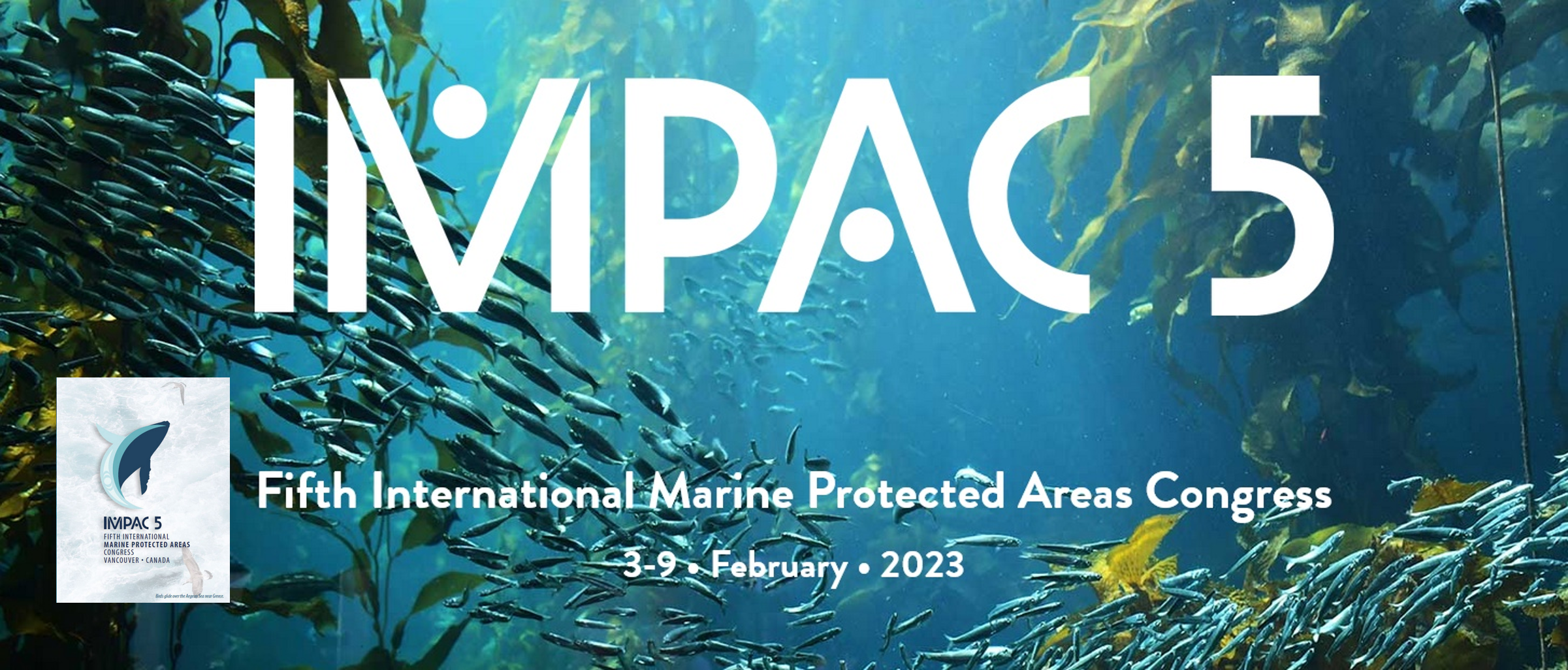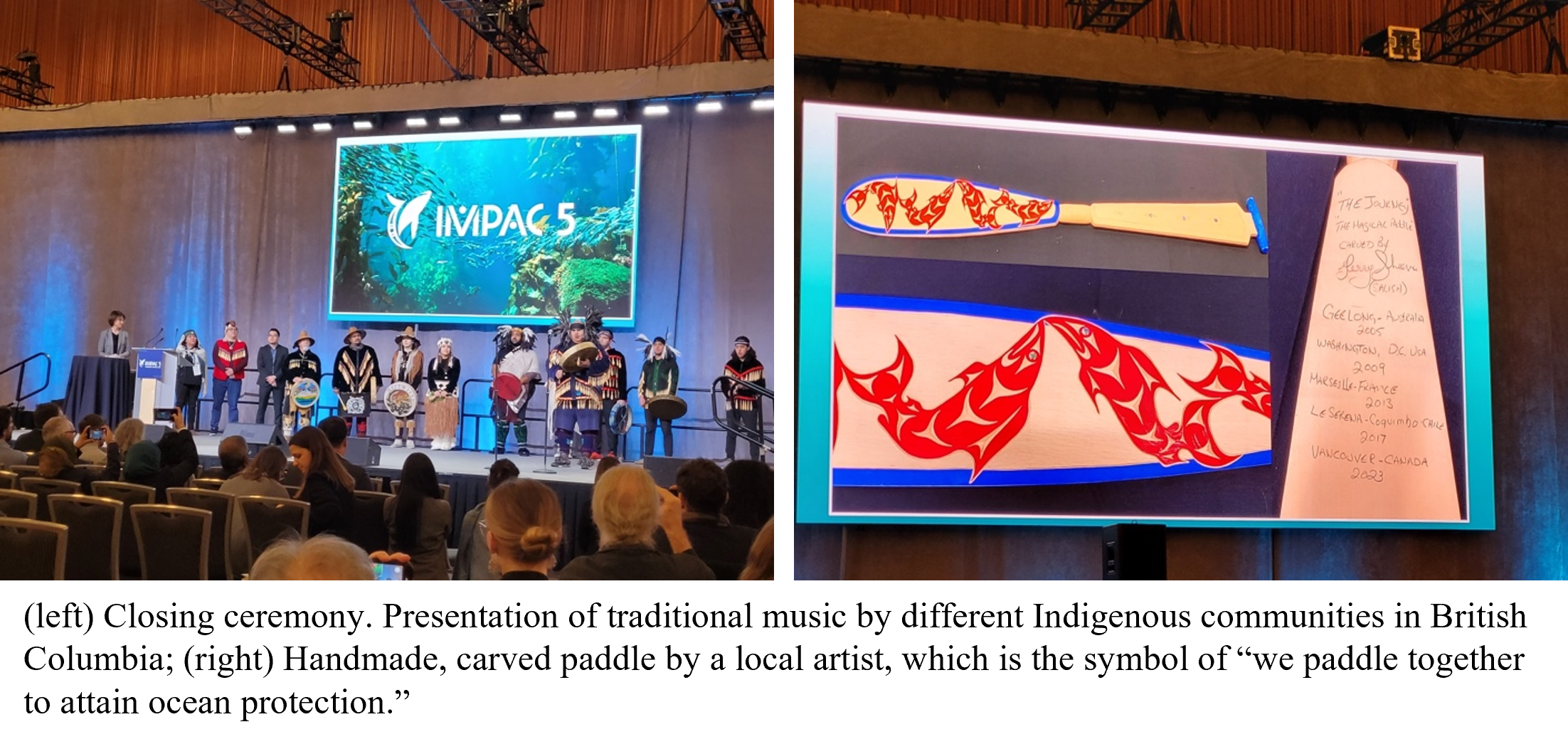Since the declaration of the United Nations Decade of Ocean Science for Sustainable Development (2021-2030), an incredible push to address biodiversity loss and climate change has become widespread. As part of efforts to ensure ocean protection, the Fifth International Marine Protected Areas Congress (IMPAC5) was held in Vancouver, Canada from 3-9 February 2023. Attendees represented about 123 nationalities and ocean conservation professionals and high-level officials spoke about the urgency to find and implement innovative solutions to ocean dilemmas and collectively determine a pathway towards increasing ocean protection. A key focus of the congress was ratification of commitments reached at the COP15 Convention on Biological Diversity (CBD) held in Montreal, Canada 7-19 December 2022. The Kunming-Montreal Global Biodiversity Framework (GBF) encourages signatory countries to step up to conserve 30% of the ocean by 2030 (following commitments to the Aichi biodiversity conservation targets that countries signed at the COP10 in 2010)
Each day, the IMAC5 congress, a hybrid event with in-person and online programming, began with keynote speakersfrom around the globe who are leaders in marine conservation and who brought different perspectives to oceans protection. They addressed the importance of evidence-based decision-making processes for ocean governance, the integration of different knowledge systems, the consideration of social concerns within marine conservation activities, the need to reframe “capacity building” as “capacity sharing” so local knowledge and experience can be acknowledged, including the essential role of Indigenous communities as environmental stewards, and necessary Indigenous groups and youth engagement.
In total, the conference featured 15 keynote presentations, and each provided outstanding talks and inspirational insights, as we collectively move towards effective design, planning, conservation, and management of Marine Protected Areas and networks. Leaders and representatives from different Indigenous communities, such as Hinano Teavai-Murphy, Michael Vegh, Dalee Dambo Dorough, and Cloy-e-iis, Judith Sayers, were key speakers who shared their knowledge about the connections between sea spaces and cultural practices, and the important role of Indigenous groups and communities as stewards of the sea. As “oceans people” Indigenous communities have a major role in the establishment and conservation of marine spaces. Their rights and access should be acknowledged and respected, and the Government of Canada is working towards this goal.
Each keynote speaker provided inspiring messages about different issues of ocean conservation. For example, Aulani Wilhelm, Senior Vice President for Oceans at Conservation International, stressed the significance of understanding how local communities relate to nature and places. She noted it is important to recognize that “MPAs are a human construct.” Therefore, it is crucial that the “benefits from MPA are equitably shared.” The success of MPA management depends on “making marine conservation equitable.” As other presenters did, she drew attention to the need for “growing political consensuses,” and emphasized that “principles of equity and justice guide conservation work.”
 Christina Mittermeier, co-founder of SeaLegacy, a non-profit organization that applies strategic communications to depict the intersection of art, science, and communication to advocate for the protection of marine habitats and species, provided a stimulating presentation about how “conservation photography” can assist grass roots conservationists to communicate the incredible actions they pursue to tackle biodiversity loss and bring awareness to the impact of climate change. Likewise, the well-known Sylvia Earle – identified as the “queen of marine conservation” – (founder and co-chair of several marine conservation initiatives and programs), gave a stimulating reflection on how humans can change the course of environmental impact by taking action to protect the unknown ocean, so we can continue exploring and learning from it. Dr. Earle posed several questions to signal the choices we can make individually and collectively to save marine habitats and species, and she focused attention on how, by using our power and voice, we can make transformations needed to stop biodiversity loss.
Christina Mittermeier, co-founder of SeaLegacy, a non-profit organization that applies strategic communications to depict the intersection of art, science, and communication to advocate for the protection of marine habitats and species, provided a stimulating presentation about how “conservation photography” can assist grass roots conservationists to communicate the incredible actions they pursue to tackle biodiversity loss and bring awareness to the impact of climate change. Likewise, the well-known Sylvia Earle – identified as the “queen of marine conservation” – (founder and co-chair of several marine conservation initiatives and programs), gave a stimulating reflection on how humans can change the course of environmental impact by taking action to protect the unknown ocean, so we can continue exploring and learning from it. Dr. Earle posed several questions to signal the choices we can make individually and collectively to save marine habitats and species, and she focused attention on how, by using our power and voice, we can make transformations needed to stop biodiversity loss.
Britt Wray, a researcher working at the interface of climate change and mental health, provided an informative talk about mental emotional distress caused by the climate change crises. Dr. Wray discussed the effects of “ecological grief” on livelihoods and cultural practices, and how “eco-anxiety” resulting from the effects of climate change is affecting youth and conservation academics and practitioners. She encouraged members of the audience to recognize their own “eco-emotions,” to build up personal and moral responsibility, to get to a place of conviction and to develop “internal activism.” We all can contribute to the conservation of the oceans!
The congress offered about 240 sessions, which included 15- 60- and 90-minute symposia within five core themes: building a global marine protected area network; advancing conservation in the blue economy; actively managing marine protected areas and human activity; conserving biodiversity and addressing the climate crisis; and connecting ocean, culture, and human well-being. The themes were organized within three cross-cutting streams: Indigenous Peoples Leadership; The Voice of Youth Professionals; and Innovation and Transformational Change.
The sessions I attended each day reflected work conducted by many researchers, practitioners, and conservationists from different places around the world, which highlighted the diversity of methodological and theoretical approaches, frameworks, and tools used to address ocean sustainability. For example, key lessons identified from the session on “scaling up MPA networks across a global marine portfolio” highlighted the importance of participation by relevant actors, trust, and social capital as key elements of effective marine conservation, and also noted the use of different engagement formats, consideration of voluntary MPA ambassadors (community champions), information sharing, and that effective communication contributes to the transparency and legitimacy of decision-making.
Sessions of professional interest to me related to the integration of human dimensions in MPAs. For example, “mainstreaming equity in MPAs – a global outlook from local perspectives”; “synergies and trade-offs in marine conservation”; “evaluating and assessing social factors in MPA management”; “participation, inclusion, and diversity in marine conservation”; and “social equity and marine conservation” to mention some, focused attention on the significance of understanding social considerations as “MPAs impact different elements of human well-being” (Dr. Natalie Ban).
There were important reflections about “how MPAs are implemented” and “what the 30×30 target means to local communities and how they will be impacted” (Dr. Nathan Bennett). The important role of social science in understanding behaviours, perceptions, and attitudes in MPA planning was highlighted; important consideration on “what is needed to really push the boundary towards more equitable marine conservation” (Aulani Wilhelm), and “how we can make equity accountable – equity that is institutionalized in conservation practice” (Dr. Ana Spalding).
As first-time attendee to the IMPAC congresses, I was inspired by the quality of the presentations and hard work of speakers from different corners of the work who are trying their best to tackle social-ecological complexities. Being surrounded by experienced academics and practitioners, and young professionals eager to contribute to marine conservation, I gained a sense of renovated hope in the mission we, individually and collectively, have to protect our oceans. Attending IMPAC5 was an inspiring experience and triggered courage in me to contribute to the important task of protecting the oceans and supporting inclusive and equitable marine conservation.
Author: Diana Burbano, Ocean Frontier Institute Post-Doctoral Fellow, Department of Sociology and Anthropology, Dalhousie University
Image credit: Photographs by Diana Burbano

